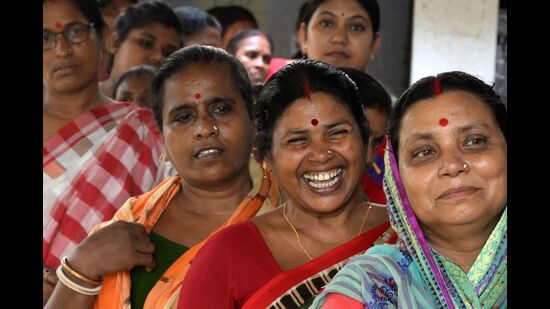Jul 10, 2024 09:24 PM IST
All women globally should have unhindered and equitable access to a basket of contraceptive choices.
In the late 1990s, the United Nations Population Fund (UNFPA) appointed me as the Goodwill Ambassador for South Asia. All charged with my new role, I set out to speak with many women whom I was working with in the slums of Mumbai. I also visited hundreds of women in villages and realised that having multiple children was not their choice. They were aware about the harmful impact it had on their bodies and the children, many of whom were malnourished and many more were anaemic. I remember telling a woman that I would arrange a regular supply of contraceptive pills for her, which she could take discreetly without her mother-in-law or husband knowing. She looked at me with disbelief at my ignorance, and said, “Didi, do you really think there is a single spot in my hut where I can hide something without the other family members knowing?” Discussing family planning was seen as a taboo in many communities.

Several factors including patriarchal attitudes and social norms restricted women’s autonomy in making decisions regarding their sexual and reproductive health, including family planning. This fact needed to be brought to the table in the numerous dialogues concerning gender equality, family planning, sexual and reproductive health and HIV/AIDS. I had the opportunity to interact with multiple stakeholders — from government officials to community leaders, the public as a Member of Parliament from 1997 to 2003, I also had the opportunity to speak with many rural women. Since then, we’ve seen commendable progress in advancing conversations around family planning. However, much remains to be done to achieve India’s Family Planning 2030 vision, which aims to increase access, choice, expand contraceptive options, and enhance the quality of family planning services. Access to modern contraceptives remains a significant challenge, and addressing this issue is crucial for ensuring gender equality.
Over the years, the basket of contraceptive choices has expanded significantly. These newer, safer and simpler methods can truly empower women to make more informed decisions about their health and their careers and lead more fulfilling lives. Challenges regarding knowledge and access to modern contraception for both men and women persist. Despite the availability of modern contraceptives, the use of traditional methods among married women (aged 15–49 years) has almost doubled — from 5.7% (2015-16) to 10.2% (2019-21), according to the latest National Family Health Survey (NFHS-5) data. We must ask ourselves: Are we truly addressing the root cause that hinders the widespread adoption of modern contraceptive methods? Additionally, how and why are modern contraceptives more effective — and who do they benefit?
All women globally should have unhindered and equitable access to a basket of contraceptive choices. In the Indian context, access to temporary, spacing methods is particularly critical, given the large young population in the country. Contraceptives like injectables, implants, and intrauterine devices (IUDs) provide reliable, long-term protection against unintended pregnancies. Furthermore, self-administered methods offer women greater autonomy, allowing them to manage their reproductive health with greater ease and confidence. While all contraceptives have side effects, the benefits of modern contraceptives for women are profound. They lead to better maternal outcomes by reducing the risk of unintended pregnancies and associated health complications. By enabling women to space their pregnancies, contraceptives contribute to improved health for both mothers and their children. Women can achieve better nutritional status, recover fully between pregnancies, and provide better care for their children. Furthermore, the ability to plan and space pregnancies empowers women to pursue education and career opportunities, giving them more autonomy and control over their lives, thereby enhancing their economic independence and leading more fulfilling lives. and overall well-being.
According to NFHS-5, the unmet need for spacing has decreased from 12.9% in 2015-16 to 9.4% in 2019-21, highlighting the growing recognition of the benefits of spacing methods. After all, family planning is not just about preventing unwanted pregnancies; it is about empowering women with the knowledge and resources they need to make the best decisions for themselves and their families. When couples have access to a wide range of modern contraceptive options, they can plan their lives better and contribute to creating a healthy and stable family. To truly empower women and improve their reproductive health, we must focus on creating efficient, affordable, and reliable ways to access contraceptive products and services and integrating family planning into primary health systems. There is an imperative to inform and educate communities while prioritising the needs of newly married couples, those without children, and postpartum and post-abortion women.
Moreover, we must confront and dismantle the misconceptions surrounding contraceptives. Societal attitudes often perpetuate myths and misinformation, creating a climate of judgement around women’s reproductive choices. Public figures, activists, and leaders have a responsibility to challenge these attitudes and advocate for policies that respect and protect reproductive rights. By making these strategic efforts, we can ensure that every woman and her partner has the freedom to make informed decisions about her reproductive health, leading to healthier families, stronger communities, and a more equitable world.
Shabana Azmi is an actor/activist and former Goodwill Ambassador, UNFPA. The views expressed are personal
Story Saved


